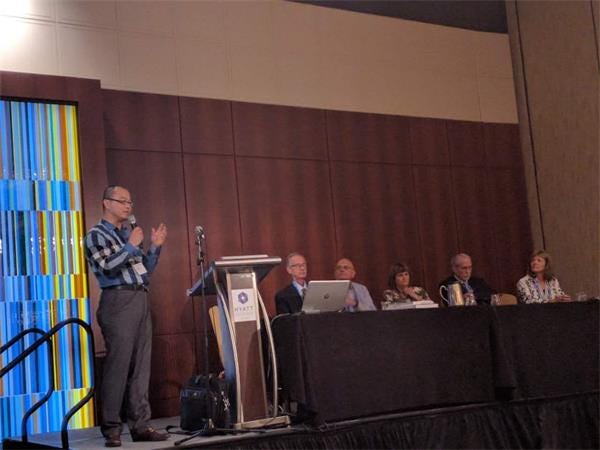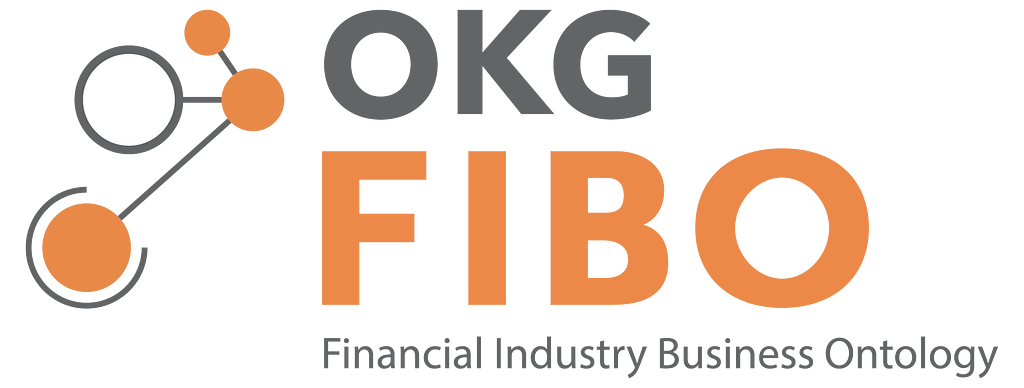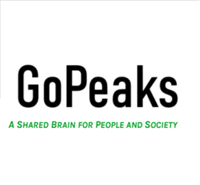https://ift.tt/30580Zj We need a Research-Practice Knowledge Synthesis System for Business and Management Background In a symposium I org...
We need a Research-Practice Knowledge Synthesis System for Business and Management
Background
In a symposium I organized at the 2017 Academy of Management (AOM) Annual Meeting, five former AOM presidents led the audience to envision a desirable science-practice knowledge system. Together, we imagined a future where management researchers and practitioners are connected directly on a shared digital platform –both benefit in a timely fashion from each other’s unique experiences, data, and knowledge (see a summary note). This knowledge platform will constantly cumulate and integrate fragmented insights together into collective wisdom.

The current knowledge infrastructures, however, have been incentivizing scholars to focus on normal scientific and reductionist research. Such research is perpetuated by discipline boundaries, peer pressures for granular specialization, technical limitations of periodical outlets (space, scope, and frequency), and a lack of diversity in scholarly incentives (publish or perish).
The normal scientific and reductionist research is perpetuated by discipline boundaries, peer pressures for granular specialization, technical limitations of periodical outlets (space, scope, and frequency), and a lack of diversity in scholarly incentives (publish or perish).
Limitation of the Current Infrastructures
When it comes to solving complex social problems such as multiple stakeholder values, sustainability, and social welfare, our current infrastructures become insufficient (Chen & Hitt, 2021). The literature, data, and community are increasingly fragmented. It becomes exceedingly difficult to develop complete and actionable frameworks connecting different knowledge fragments, and the effects across these fragments are poorly understood.
The literature, data, and community are increasingly fragmented. It becomes exceedingly difficult to develop complete and actionable frameworks connecting different knowledge fragments, and the effects across these fragments are poorly understood.
After more than six decades of scientific research in business management, our knowledge is at a volume that makes knowledge synthesis possible and at a degree of fragmentation that makes knowledge synthesis necessary. Time is ripe to invent a knowledge synthesis platform with mutually supportive components that give rise to knowledge accumulation. This platform should continuously integrate fragmented knowledge sources in both academic and professional communities, and generate timely, actionable, and easily accessible evidence-based frameworks for managing organizations concerning their various stakeholders.
Time is ripe to invent a knowledge synthesis platform with mutually supportive components that give rise to knowledge accumulation.
To do so, we need to overcome three persistent hurdles that the current infrastructures (e.g., scholarly periodicals) are incapable of doing.
The first hurdle is fragmented science
It is a complex task for an organization to deliver values to various stakeholders, involving interactions across many levels, disciplines, and heterogeneous utility functions (Bridoux & Stoelhorst, 2014). The conventional scientific approach is to study these different components in a piecewise manner using discipline-based, coherent theory-driven, and reductionist models. The proposed platform should bring together management concepts, models, theories, and findings from different domains into a unified knowledge representation. To cater to audiences from different domains, it should also elucidate inarticulate assumptions and beliefs that are often domain-specific.
Potential systematic solutions include:
- Developing and unifying an ontology for business and management concepts
- Constructing a machine-readable knowledge graph with embeddings of theory-relevant properties
- Building multi-level, complex conceptual frameworks that simulate the dynamics of the social-ecological system for creating and distributing stakeholder values
- Developing a meta-framework that can capture the shared as well as heterogeneous motivations of individuals situated in different stakeholder identities
Some exiting efforts we can build on include:
- TheoryOn on semantic matching among human behavior constructs and models, funded by NSF and led by PI Kai Larsen (University of Colorado, Boulder)
- The Business Open Knowledge Network (BOKN) Project on entrepreneurship relations, funded by NSF and led by PI Jay Pujara (University of Southern California)
- Causal Knowledge Graph (CausalKG) for Business and Management Project, which has developed a comprehensive taxonomy for causes-and-effects on organizational performance, funded by NSF and led by PI Victor Zitian Chen (University of North Carolina, Charlotte)
- Machine reading of scholarly documents in business and non-coding knowledge visual representation, led by PI Victor Zitian Chen (University of North Carolina, Charlotte)

- The Financial Industry Business Ontology (FIBO), privately funded by Enterprise Data Management (EDM) Council and led by David Newman at Wells Fargo
The second hurdle is distributed data
We enjoy an increasing volume, frequency, and velocity of both structured and unstructured data (e.g., natural language processing [NLP] data, etc.) concerning different stakeholder issues. However, many data are kept in dispersed, uncoordinated, and often private sources. As a consequence, empirical evidence we can access from scholarly documents is likely based on incomplete or biased fractions of the world, rather than a coherent, tightly integrated global sample. New techniques are needed to make sense of fragmented empirical evidence and synthesize these fragments timely into a more complete and unbiased set of evidence.
Potential systematic solutions include:
- Developing data sharing and query platforms where publicly accessible data can be automatically compared, merged, and reused, and privately accessible data can be indexed together and requested in packages.
- Reinventing the mathematics of meta-analytic techniques to incorporate nonlinearity, missing interactive terms, as well as hidden moderators for evidence synthesis
- Developing meta-machine learning (ML) algorithms to aggregate statistical and ML results from multiple data sources that cannot be perfectly merged
- Developing NLP algorithms that can detect and compare unstructured data sources based on the taxonomies/ontologies to assist a synthesis of the massive literature across management research areas
Some exiting efforts we can build on include:
- metaBUS platform that curates 14,000+ OBHR and management publications, funded by NSF and led by PI Frank Bosco (Virginia Commonwealth University)
- HubMeta platform that allows researchers to upload meta-analysis works in progress, led by PI Piers Steel (University of Calgary)
- Big Mechanism Project, funded $45 million by DARPA and led by then program officer Paul Cohen (now University of Pittsburgh)
- CausalityLink, an AI company specializing in connecting causes-and-effects in textual documents with financial indicators, led by Co-founder and CEO Pierre Haren
The third hurdle is the disconnection between evidence and practice
Knowledge on practical problems progresses through continued cross-validation between evidence-based practice and practice-based evidence, the two of which are however increasingly isolated. Direct observations, unstructured data resources, and context specifics on various stakeholders such as employees, customers, suppliers, and community relations are often inaccessible to researchers (George, Haas, & Pentland, 2014). There has yet to be a scalable platform where truth from both sides can be shared in a timely and trusted fashion. Our understanding of the world thus risks being based on outdated, inaccurate, incomplete, and indirect evidence, whereas practice may be based on insufficiently tested or non-replicable principles.
Potential systematic solutions include:
- Designing and implementing a graphical user interface that allows instant information exchange between workplaces and external research communities
- Designing and implementing privacy-preserving protocols that allow the reporting of empirical findings but meanwhile protecting sensitive identities and information
- Designing and implementing an incentive system that workplace analytic offices can benefit from using models and frameworks developed from the scientific literature
- Designing and implementing a platform where stakeholders can directly evaluate an organization’s performance from their perspective without an agent, and the top leadership can receive evidence-based intervention recommendations to respond to stakeholder evaluations
Some exiting efforts we can build on include:

- Explainable AI (XAI) for Enterprise Performance Management Project, which has interviewed 100 enterprise analytics vendors, consultants, and end-users, funded by NSF and led by PI Victor Zitian Chen (University of North Carolina, Charlotte)
Planning Activities
Change takes time, even in the most optimistic times. We need to form a committed and collaborative community across disciplines (e.g., AOM and INFORMS) to champion a series of activities that incrementally give rise to the new knowledge synthesis system. Below are some proposed activities and a timeline.
Change takes time, even in the most optimistic times. We need to form a committed and collaborative community across disciplines
2021–2022: Organizing Joint Special Issues and Workshops between MIS and Management
With a few leading management scholars, I am exploring the possibility of hosting a joint special issue among one or multiple elite review journals in management and one or multiple elite journals in MIS. The SI will call for two tracks of contributions. The first track will call for MIS scholars to review the existing working examples of knowledge governance in both academia and practice and suggest the design principles for a science-practice knowledge synthesis platform for business and management. The second track will call for management scholars to review the existing theories, models, and empirical findings in organization and management, and suggest a holistic framework where reductionist pieces can be compared, synthesized, and continually updated.
The editorial team will then bridge the two tracks of contributions into a concrete blueprint for a science-practice knowledge synthesis system, published first as a journal article and then adapted as grant proposals for multiple major grant agencies (e.g., NSF, DOD, Sloan Foundation) for implementing the design into reality.
Several workshops will be organized to gather stakeholders and raise the publicity of this initiative. Editors of elite review journals and prominent scholars with major review contributions will be invited as panelists or speakers.
2022–2023: Establishing New Interest Groups at Leading Academic Associations
Currently, most interest groups at leading academic associations (e.g., AOM and INFORMS) are based on specializations. This way of dividing interests per se perpetuates the fragmentation of knowledge. Many scholars suggest that Knowledge Synthesis be an interest group by itself. Scholars with an integrated mindset will be invited to form a new interest group at major associations such as AOM and INFORMS.

Some communities have been built in the following events I organized:
- With editors of AoM Annals, AoM Collections, Annual Review, JOM, JIBS, and IJMR, a proposed symposium on “Curating collective wisdom: Exploring new infrastructures for knowledge synthesis” at the 2021 AOM Meeting
- With Henry Mintzberg, Peter Lorange, Bill Click, and JC Spencer, a symposium on “Designing the future business schools” at the 2015 AOM Meeting
- With EICs and AEs of MISQ, AMR, JAP, JIBS, and ASQ, a workshop on “Creating a more reliable and cumulative knowledge ecosystem” at the 2016 AOM Meeting
- With five AOM presidents, a symposium on “Time is ripe for knowledge synthesis” at the 2017 AOM Meeting
- With Responsible Research in Business & Management (RRBM), a workshop on “Building a management knowledge navigator” at the 2019 AOM Meeting
2023–2024: Submitting Proposals for Big Grants to Multiple Agencies
As mentioned, leading researchers in the new knowledge synthesis community will work together to submit multiple grants to major funding agencies. The problem of knowledge fragmentation has been recently raised by major funding agencies, which attempt to incentivize the integration of currently isolated knowledge advancements. For instance, in the 2017 consultation of its Research Excellence Framework, the UK Research and Innovation, the largest funding agency for higher education institutions, proposed a series of revisions to its old review policies that tend to disadvantage interdisciplinary research. In the US, the National Science Foundation defines Growing Convergence Research, a type of research that seeks to integrate advances across disciplines for solving complex problems on societal needs, as one of its current 10 Big Ideas for investment priorities. More specifically, the Defense Advanced Research Projects Agency (DARPA) in the US carried out a $45 million Big Mechanism program between 2014 and 2017 to fund innovations for the integration of fragmented cancer models into a holistic causal framework (You, 2015).
Some programs that are relevant for this science-practice knowledge synthesis system include:
- Wikimedia Foundation Projects and Events Grant (Target: $30K)
- DOD/US Army Institute for the Behavioral and Social Sciences Broad Agency (Target: $100K)
- NSF Science of Organizations Program (Target: $200K)
- NSF Science of Science Program (Target: $200K)
- Innovation UK STFC Innovation Partnership Scheme (Target: £360K)
- NSF Partnerships for Innovation Program (Target: $500K)
- NSF Research Coordination Networks Program (Target: $500K)
- ESRC Research Grant (Target: £1 million)
- Sloan Foundation Scholarly Communications and Universal Access to Knowledge (Target: $2 million)
- Innovation UK Smart Grants (Target: £2 million)
- NSF Growing Convergence Research Program (Target: $3.6 million)
- NSF Future of Work at the Human-Technology Frontier Program (Target: $6.65 million)
- NSF Convergence Accelerator Program (Target: $8 million)
*Some grants are ongoing, but some may end or be replaced with new programs by the time of application.
Grand Synthesis was originally published in Towards Data Science on Medium, where people are continuing the conversation by highlighting and responding to this story.
from Towards Data Science - Medium https://ift.tt/3H7NZ5n
via RiYo Analytics

No comments